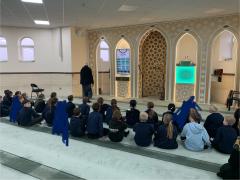Religious Education (RE)
Intent:
At Malpas Alport we strive to allow our pupils to:
Develop a secure understanding of Religious Education through knowing and understanding a range of religious and worldviews.
Develop an awareness and mutual respect of/for all cultures and religions, including non-religious belief systems.
Gain the skills and maturity to make their own decisions and create their own values.
Challenge stereotypical views, racism and discrimination and appreciate difference positively.
Implementation:
At Malpas Alport Primary, our curriculum is based on the Cheshire West and Chester Agreed Syllabus for RE. The academic year is broken down into six blocks of learning, per year group, across the year. Please refer to the Long Term and Medium Term Plan documents, attached below, for more information on what is taught and when.
We implement our intent through a variety of teaching and learning experiences to develop knowledge of the religion and an understanding of what it feels like to be part of that religion. The ways we achieve this are by:
- Adopting an enquiry based approach beginning with the children’s own life experiences, (such as birthday celebrations and other festivals/celebrations), before moving onto learning about other religions.
- Immersing ourselves in a practice from another religion, e.g. a mock wedding or christening or experiencing a shabbat meal
- Inviting faith speakers into the school to deliver assemblies or workshops
- Visiting a place of worship and/or exploring religious artefacts and texts and finding out about their use and religious significance
- Watching educational videos to find out about other cultures and religious customs
The RE curriculum is underpinned by the Progressive Skills Document where objectives for each year group are progressively mapped out to ensure our pupils are given the acquired skills and knowledge the further their education journey into KS3. The learning expectations for each key stage are set out below.
Impact
By the end of EYFS, children will:
- Consider what makes them unique and special.
- Look at different festivals (Christmas, Easter, Harvest, Eid, Diwali, Chinese New Year) and explore food and clothes linked to them.
- Introduce and use multi-syllabic vocabulary, such as religion, community, Christian.
- Listen to longer stories, remembering much of what happens.
- Explore places of prayer, worship and reflection and talk about what happens there.
- Talk about people who are special to us, who belongs to our family and look at photos. Celebrate belonging to a family and community, birthdays and naming ceremonies, meeting and talking with faith members from the community.
- Show care and concern for each other and the people in the community who help us.
- Explore the natural world and respond to questions such as What makes the world a wonderful place? Model and encourage responses to ‘why’ questions such as ‘Why should we look after the world?’
By the end of key stage 1, children will:
- Describe what happens at festivals, ceremonies and rituals and talk about the beliefs behind them. (Y1)
- Tell of the ways people express identity in belonging to a faith group and show how they are similar to another faith group. (Y1)
- Talk about what happens in places of worship and describe how symbols and artefacts are used in each, appreciating some similarities and differences. (Y1)
- Retell and suggest meanings for some religious and moral stories and say how they influence people today. (Y1)
- Consider and make responses to big questions from different worldviews. (Y1, Y2)
- Express ideas and opinions about moral questions of right and wrong. (Y2)
- Share ideas and examples of cooperation between people who are different. (Y2)
- Recall different beliefs and practices, naming key words, key figures and core beliefs. (Y2)
By the end of key stage 2, children will:
- Describe and show understanding of links between different sacred texts and how those faith teachings influence communities and society today. (Y3,Y4,Y5, Y6)
- Express understanding of the key concepts underpinning different faiths, linking sources of authority to belief. ( Y5, Y6)
- Make connections between the beliefs that underpin different celebrations, forms of worship, pilgrimages and rituals. (Y3, Y4, Y5, Y6)
- Consider and apply ideas about ways in which diverse communities can live together for the wellbeing of all, responding thoughtfully to ideas about community, values and respect. (Y3,Y4)
- Demonstrate understanding of how people of faith express their identity and their spirituality through symbols and actions. (Y3,Y4, Y5, Y6)
- Articulate the responses of different religions and non -religious worldviews to ethical questions, including ideas about what is right and wrong and what is just and fair. (Y3, Y4, Y5 Y6)
- Offer some answers to ultimate questions from different religious and non-religious perspectives. ( Y5,Y6)
- Show understanding of the challenges of commitment to a community of faith or belief, suggesting why belonging to a community may be valuable. (Y5, Y6)
Alongside the development of unit specific knowledge and understanding we would also be looking for the development of skills and attitudes throughout the school.
Religious Education should help pupils to:
- cultivate philosophical thinking skills within the pupils
- improve mental focus and develop the ability to sustain it
- develop critical thinking skills’
- empathise, evaluate, question, relate and express
- apply the lessons of the classroom to their personal interactions • discover how philosophy helps them understand life and ask questions that further improve their understanding
- learn to apply rigorous academic standards to issues of ethical and philosophical importance
- look at the world with an inquisitive and unbiased perspective
- use religious and philosophical thought to suggest solutions to human problems
- have a sense of awe
Our ongoing skills development include critical thinking, religious tolerance, investigation, interpretation, reflection, evaluation, analysis, synthesis, application, expression, self-understanding, communication, problem solving.
Our developing attitudes in religion and world views include self-esteem, curiosity, fairness, respect, empathy, wonder, open-mindedness, working with others, sense of community.

